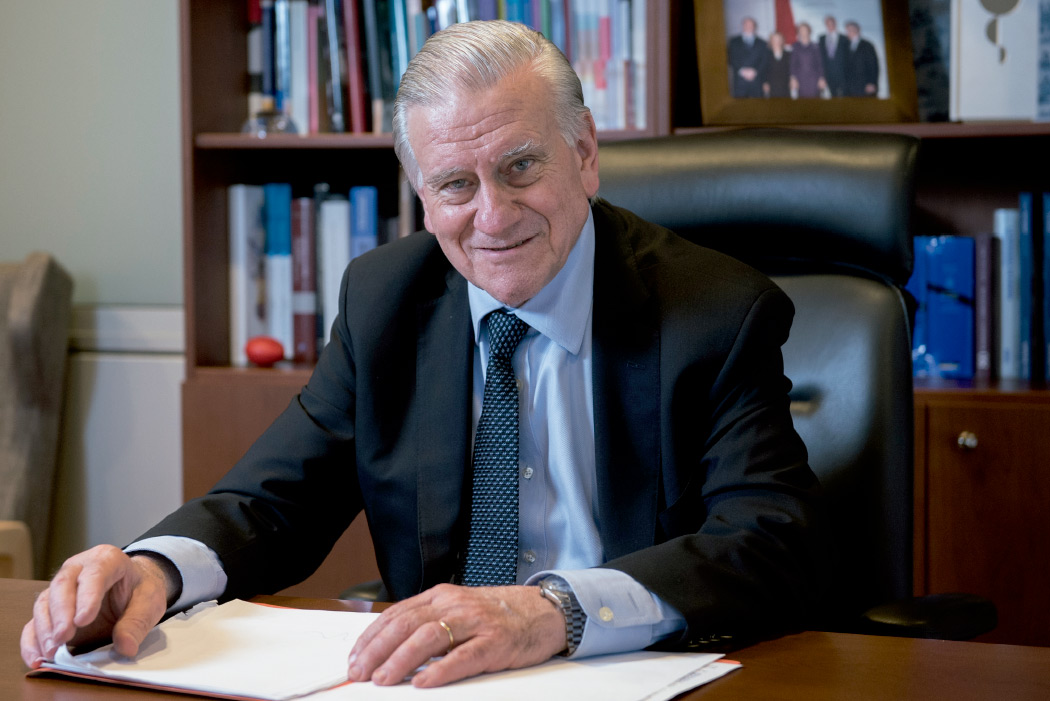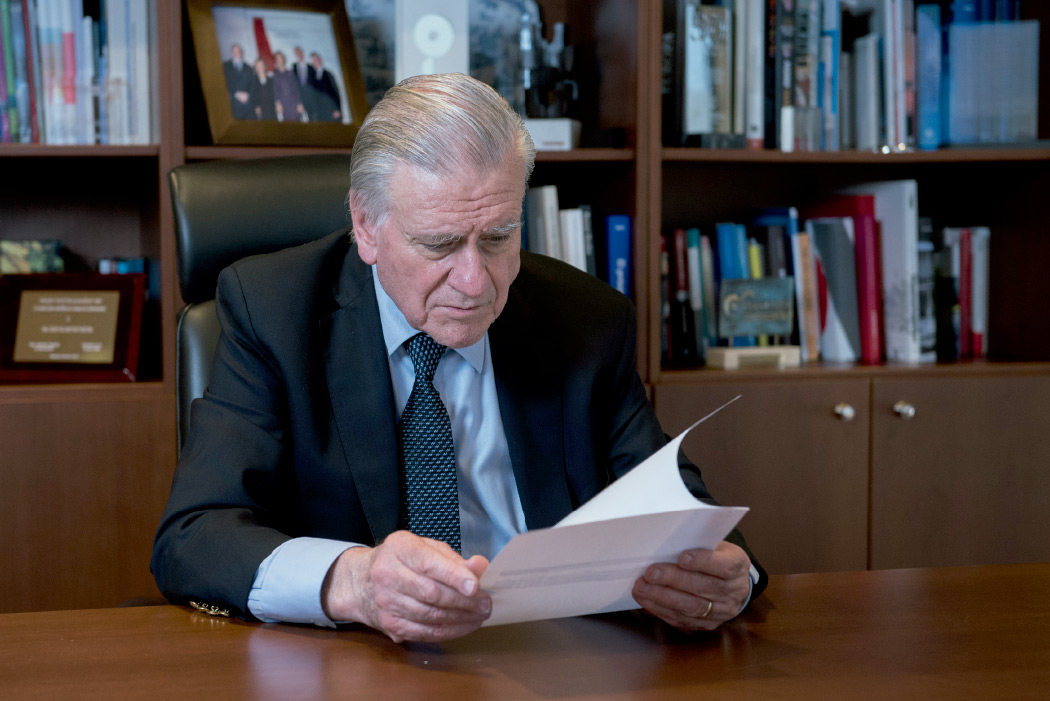Valentín Fuster:
"This pandemic has been a warning for us to all become more human"

According to Dr. Valentín Fuster, General Director of the Carlos III National Center for Cardiovascular Research (CNIC) of Madrid, Director of the Cardiovascular Institute and “Physician-in-Chief” of the Mount Sinai Medical Center in New York, the COVID-19 pandemic has, in some way, caused the world to be changing: “Societies - affirms Dr. Fuster - have realized the disparities that exist in the world and, although there is frustration because the vaccine does not arrive and the pandemic does not end, a greater individual generosity has also emerged, and collective too.”
Is this knowledge going to help us prepare for a future pandemic?
Undoubtedly. The second point of the report “Global Health and the Future Role of the United States,” in which I was the co-director, already warned in 2017, that the biggest problem, and the one that was most urgent to address, was that we were not prepared for a pandemic. It seems simple, predictable, and obvious. But when the SARS-CoV-2 pandemic hit we all felt out of place; that is, we did not know what was happening. In this report, which identified the challenges and priorities in health, 14 recommendations and priority areas were made for the US Government and the rest of the agents involved in health, and it was pointed out that the second problem was the possibility of viruses mutating. When the plague pandemic struck, the world was not prepared, and unfortunately, with the COVID-19 pandemic it wasn’t either. But I think now we are ready for changes in strains, mutations, etc. I think that all this scientific effort is going to be very positive.
How do you think the world responded to this enormous challenge?
The response has been out of step. There are two communities that fluctuate: the public and the government, and the more personal one. They both fluctuate from positive to negative and vice versa. And between them there is a kind of separation; in other words, there is an imbalance: When one is positive the other is negative; there is always the confrontation between society and the individual, and this is a historical thing. And this process has been exciting in the field of health. During the month of March, we found that everyday 5 to 7 patients died at Mount Sinai Medical Center in New York. And the truth is that we did not know what was happening. We were facing a very complex disease; little by little we have advanced in its knowledge and now we already know a lot about it. We analyzed data from a cohort of 7,000 positive COVID-19 patients at Mount Sinai Medical Center hospitals in New York. As a result, we realized that this disease has four stages and that it is vital to determine what stage the patient is in to provide the best response. We learned that the virus enters the upper airways and settles in the lung. In this phase the most common symptom is a cough. The second stage is when the virus passes into the blood and causes fatigue, fever. But, it does not necessarily mean hospital admission. In phase three, the virus passes from the blood to other organs. It is when the individual’s fight with the virus occurs. And it is this macrophage fight against SARS-CoV-2 that causes blood clots. And the last phase is the worst. This fight between the virus and the body causes the inflammatory process and the thrombi that form to block the arteries and damage or death occurs in part of the lung, heart or brain segments. These are the patients entering ICUs. And we have learned all of this over time, but at the time it all started, we didn’t know anything.
And when do you think that it is important to intervene in this process of thrombus formation with anticoagulants?
In this struggle in which we are still imbued, society hears words such as drugs, vaccines, plasma, thrombi, inflammation, cytokine storm, etc. At first we saw two cases of patients in the hospital who died with blood clots and I thought that death had occurred due to this fight between the virus and the body and as a consequence of blood obstruction by clots or thrombi. So I decided that all patients admitted to the hospital with COVID-19 had to be treated with blood thinners. But many doctors disagreed. And why do we have to treat them with blood thinners? But we saw that the mortality rates decreased by 50%. It was something observational. And over time we learned that there were actually three blood thinners that were important.
Was it after this observation that you decided to start a clinical trial?
That’s right; this led us to an international prospective study. Fellow colleagues suggested that I do it in March 2020, but I did not want to start it then and only decided to start it once we had the results of the observation. In this clinical study, in which more than 100 institutions from all over the world have participated, we have decided not to have a control group, because I do not think it is ethical at this time to give placebo. The objective is to determine the best guidelines to prevent mortality and/or referral to the ICU. We have to recruit 2,500 patients to have impactful results. We have already recruited about 1,500 and each day we include 15 or 25 more patients. This study is unique because the NIH (US National Institutes of Health) did not agree with one of the drugs we wanted to use. So we have resorted to fundraising. Of the 5 million dollars that we need, we already have 4. We have not asked for money from the US Government nor the pharmaceutical companies.
I think the speed with which vaccines have been developed and the way we are now treating patients has shown us how important science truly is.
In my opinion, there is going to be a greater awareness of science than there has been until now.

The scientific community has given an example of how you have to work or how the society of the future should be.
Without science we would not be vaccinating people right now
However, for the people, the priorities are different: masks, vaccines, etc.
Exactly. From the social point of view, the important thing is not the complexity of the treatments, but prevention thanks to social distance, the use of masks, etc. With the arrival of vaccines, politicians and society believe that they already have the definite answer. Everyone is waiting for a vaccine, but by not reaching everyone as quickly, it generates personal frustration, particularly when observing that the pandemic does not go away. And in the meantime we forget about prevention measures, which are still quite simple.
And is it at this point where you assure that society is starting to change?
On a personal level, however, collective and individual generosity arises: food banks, community support, etc. Thus, in this fluctuation that we are experiencing, from the positive to the negative and vice versa, from a general frustration and a pandemic that affects the entire population that accelerates economic or psychological problems, this personal and collective generosity arises. I hope that this generosity, which is emerging on many levels, is a lasting generosity. But the price is definitely enormous on a personal, psychological and economic level.
Scientists have given a coordinated and effective response to the pandemic. Do you think that society has understood the importance of investing in science?
I think the speed with which vaccines have been developed and the way we are now treating patients has shown us how important science truly is. In my opinion, there is going to be a greater awareness of science than there has been until now. The scientific community has given an example of how you have to work or how the society of the future should be. Without science we would not be vaccinating people right now.
Can any lessons be learned from the pandemic?
This pandemic has been an alarm for us all to become more human.

















